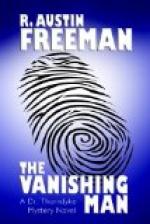“I have been expecting this visit,” Mr. Jellicoe remarked tranquilly as he placed four chairs opposite the table.
“Since when?” asked Thorndyke.
“Since last Monday evening, when I had the pleasure of seeing you conversing with my friend Doctor Berkeley at the Inner Temple gate, and then inferred that you were retained in the case. That was a circumstance that had not been fully provided for. May I offer you gentlemen a glass of sherry?” As he spoke he placed on the table a decanter and a tray of glasses, and looked at us interrogatively with his hand on the stopper.
“Well, I don’t mind if I do, Mr. Jellicoe,” said Badger, on whom the lawyer’s glance had finally settled. Mr. Jellicoe filled a glass and handed it to him with a stiff bow; then, with the decanter still in his hand, he said persuasively: “Doctor Thorndyke, pray allow me to fill you a glass?”
“No, thank you,” said Thorndyke, in a tone so decided that the inspector looked round at him quickly. And as Badger caught his eye, the glass which he was about to raise to his lips became suddenly arrested and was slowly returned to the table untasted.
“I don’t want to hurry you, Mr. Jellicoe,” said the inspector, “but it’s rather late, and I should like to get this business settled. What is it that you wish to do?”
“I desire,” replied Mr. Jellicoe, “to make a detailed statement of the events that have happened, and I wish to hear from Doctor Thorndyke precisely how he arrived at his very remarkable conclusion. When this has been done I shall be entirely at your service; and I suggest that it would be more interesting if Doctor Thorndyke would give us his statement before I furnish you with the actual facts.”
“I am entirely of your opinion,” said Thorndyke.
“Then in that case,” said Mr. Jellicoe, “I suggest that you disregard me, and address your remarks to your friends as if I were not present.”
Thorndyke acquiesced with a bow, and Mr. Jellicoe, having seated himself in his elbow-chair behind the table, poured himself out a glass of water, selected a cigarette from a neat silver case, lighted it deliberately, and leaned back to listen at his ease.
“My first acquaintance with this case,” Thorndyke began without preamble, “was made through the medium of the daily papers about two years ago; and I may say that, although I had no interest in it beyond the purely academic interest of a specialist in a case that lies in his particular specialty, I considered it with deep attention. The newspaper reports contained no particulars of the relations of the parties that could furnish any hints as to motives on the part of any of them, but merely a bare statement of the events. And this was a distinct advantage, inasmuch as it left one to consider the facts of the case without regard to motive—to balance the prima facie probabilities with an open mind. And it may surprise you to learn that those prima facie probabilities pointed from the very first to that solution which has been put to the test of experiment this evening. Hence it will be well for me to begin by giving the conclusions that I reached by reasoning from the facts set forth in the newspapers before any of the further facts came to my knowledge.




